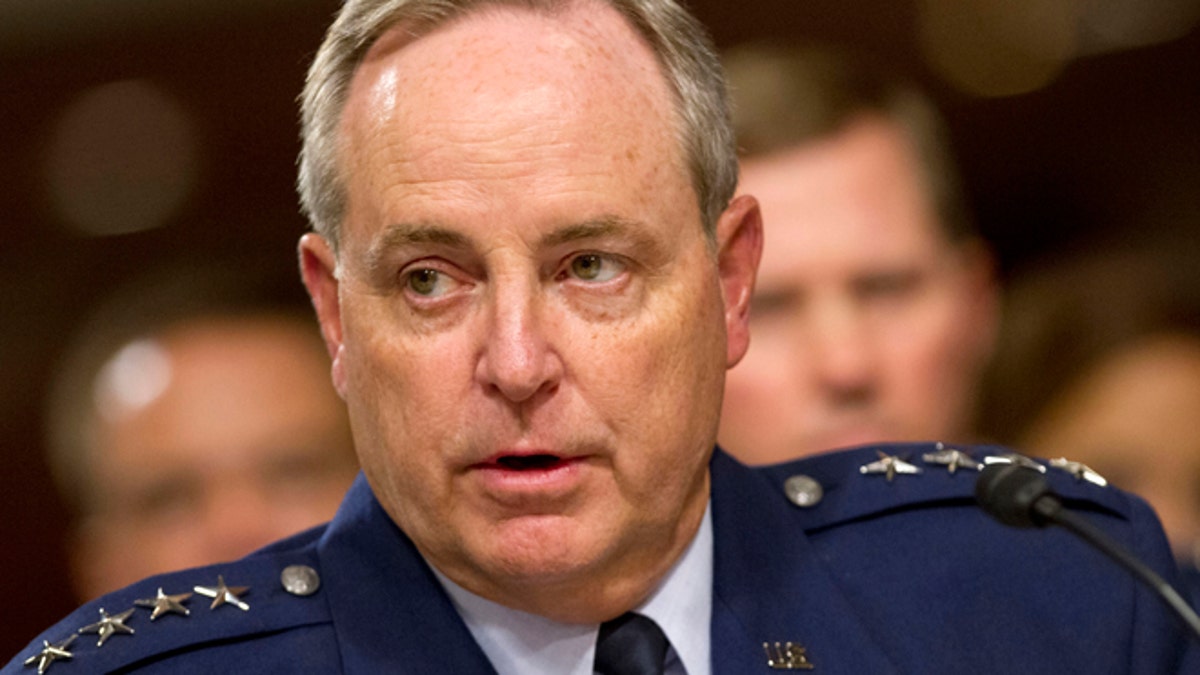
Nov. 7, 2013: Air Force Chief of Staff Gen. Mark Welsh testifies on Capitol Hill in Washington. (AP)
Thirty-four nuclear missile launch officers have been implicated in a cheating scandal and have been stripped of their certification, and three others have been implicated in a drug probe, in what the Air Force believes is the largest such breach of integrity in the nuclear force, Air Force Secretary Deborah Lee James said Wednesday.
The officers apparently texted to each other the answers to a monthly test on their knowledge of how to operate the missiles. The number includes who did the cheating as well as those who may have known about it but did not report it.
The cheating, which was discovered during a drug investigation that included two of the 34 officers, is the latest controversy involving the service members who maintain and operate the nation's 450 nuclear missiles.
In all, the drug scandal encompassed 11 Air Force officers across six bases in the U.S. and England. Of the three missile launch officers involved in the drug scandal, two were at Malmstrom Air Force Base in Montana and one was at F.E. Warren Air Force Base, Wyo. The two at Malmstrom were among those implicated in the cheating scandal.
James told a Pentagon news conference that 600 missile crew members across the Air Force were retaking the test, including nearly 200 at Malmstrom. She said that the missile force needs attention and that while immediate corrective action is being taken, Air Force leaders are planning to address some longer-term initiatives.
The Air Force said the alleged cheating took place late last summer.
"Earlier today, Secretary of the Air Force Deborah Lee James briefed Secretary of Defense Chuck Hagel on allegations that several dozen ICBM officers cheated on their proficiency tests," Pentagon press secretary Rear Admiral John Kirby said in a statement. "Secretary Hagel was deeply troubled to learn of these allegations, and he strongly supports the aggressive steps the Air Force is taking in response to them."
Last week the Pentagon disclosed the original drug probe of a total of 10 officers — nine lieutenants and one captain — at six bases. It provided few other details beyond saying the officers were suspected of possessing "recreational drugs." That has now expanded to 11 officers.
The matter is being probed by the Air Force Office of Special Investigations.
The Associated Press has reported that the Air Force's nuclear arm has been weighed down by a series of problems involving security lapses and morale-related issues, leading one officer to complain of "rot" in the force.
The original disclosure of a drug investigation said the officers alleged to be involved were at Edwards Air Force Base, Calif.; Schriever Air Force Base, Colo.; Royal Air Force base Lakenheath in England; Vandenberg Air Force Base, Calif., and two bases that operate intercontinental ballistic missiles — F.E. Warren and Malmstrom.
First word of the investigation came last Thursday moments before Defense Secretary Chuck Hagel appeared at F.E. Warren to deliver a pep talk to members of the 90th Missile Wing, which operates 150 ICBMs. Hagel did not mention the drug probe but praised the missile force for its dedication and professionalism.
The Associated Press contributed to this report.

